Andrew Rule: The poachers stripping our reefs bare and the bankrupt state surrendering
Early morning bayside walkers often spot masked men with a bag in one hand and a speargun in the other. Here’s what they’re really up to and why our government is turning a blind eye.

Andrew Rule
Don't miss out on the headlines from Andrew Rule. Followed categories will be added to My News.
The desperate boosters of a bankrupt state can talk up “self-regulation” of recreational fishing, but ordinary citizens shouldn’t be asked to confront masked men with a bag of stolen abalone in one hand and a speargun in the other.
When the tides are right, early morning walkers along the bayside path between Pt Lonsdale and Queenscliffe sometimes see poachers loom out of the pre-dawn darkness in a scene repeated at different spots along the coast.
The supposed “spear fishermen” don’t hang around to look at the sunrise — they keep their dive masks and wetsuits on and sprint straight for their cars.
Are they poaching in the nearby marine park? No one who spies them has much doubt about it. Are they taking more than the recreational limit of five abalone? A safe bet.
These duckers and divers feed into an insatiable black market tied into other branches of organised crime linked to international drug syndicates. But they are not the only bad actors stripping our fisheries at a time when a growing and changing population is already putting them under pressure.
Around “the corner” at the Queenscliffe boat ramp, and further along at St Leonards and Portarlington and across the bay at Werribee South and Altona and other places, there are smarties waiting to land the bag limit of flathead or whiting or squid, only to stash them and sneak out soon after for another bag on the same day — that’s if there’s no real threat of fisheries officers nailing them.
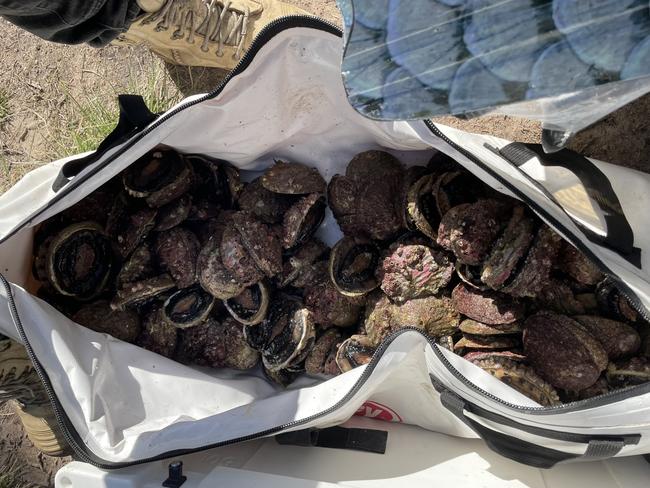
If they’re not filling freezers at the expense of more honest anglers, you can bet they’re selling to restaurants for cash.
And if government spokespeople reckon that’s a loose assertion, it is much closer to reality than the bizarre claim by a dithering bureaucrat last week that anyone who boasted they’d bagged “300 fish” would get “a punch on the nose” from outraged law-abiding anglers “at the boat ramp”.
He’s implying it’s OK to sack half the fisheries officers in the state because good old vigilantes can handle it, wild west style.
It’s hard to know if Allan government officials could possibly believe their own propaganda. Evidence that abalone and other marine life is already under attack is there for anyone who wants to face the uncomfortable facts.
Remove half the state’s fisheries officers, as happened this week, and it can only get worse. Every other abalone fishery in the world, from South Africa to northern California to south-east Asia, has collapsed from poaching that escalated into pillaging until entire reefs were stripped down to bare white rock.
There are danger signs for Victoria’s abalone industry in particular and its wider fisheries as well.
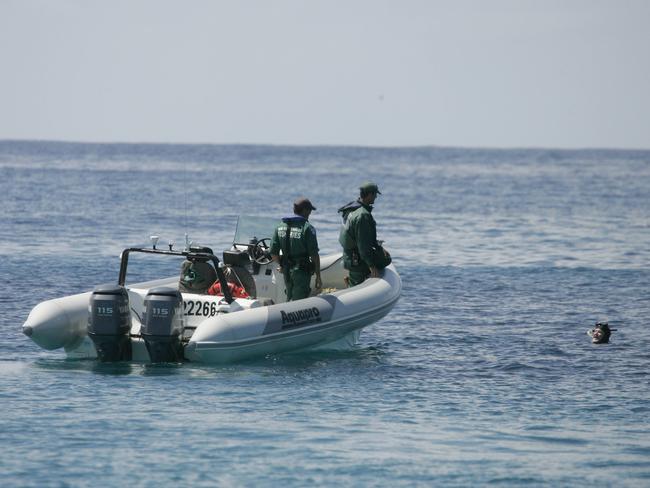
Only a few hardy surfers slip and slide down the steep track that leads down to a lonely and dangerous stretch of water on the Victorian coast far from Melbourne.
One of them has told the Sunday Herald Sun that he and a couple of other risk-takers occasionally make the dizzy descent from the 100m-high clifftop to reach the waves below.
But surfers are not the only visitors. At the base of the cliff is a rough hut built of driftwood half hidden in the rocky shore. In it is a saucepan over a campfire, suggesting that people stay for long days or overnight, waiting for the right tide.
For abalone divers, poaching is a dangerous game and not only in the water. Some sharks are on shore.
It is 28 years this week since Angelo Romeo was found shot dead in his plain delivery van in a laneway in Northcote.
The homicide squad is no closer to cracking the execution now than it was then. One reason for that was that Romeo, whose surname is associated with an organised crime family in Griffith, was an abalone dealer, a middleman who bought abalone from poachers every week.
Abalone divers, both licensed and illegal, tend to keep their grievances private. No one was ever charged with the hit, although a few licensed abalone divers came under suspicion on grounds they were angry about the organised poaching in which Romeo was a player. Then again, it could have been rival crooks, or even someone disgruntled about unpaid debts.
What the murder highlighted was that abalone was contraband so valuable that people would die over it. And not only from bullets.
The “bends” that divers suffer when they surface too fast has killed more abalone poachers than bullets or sharks ever have — but that doesn’t stop the needy and the greedy from chasing what abalone insiders sometimes call “cold gold”.
For an overgrown saltwater snail that can be as tough as a truck tyre, abalone has a big reputation and an even bigger price tag. In Asian markets it is the cocaine of cuisine, with a dash of “spanish fly.”
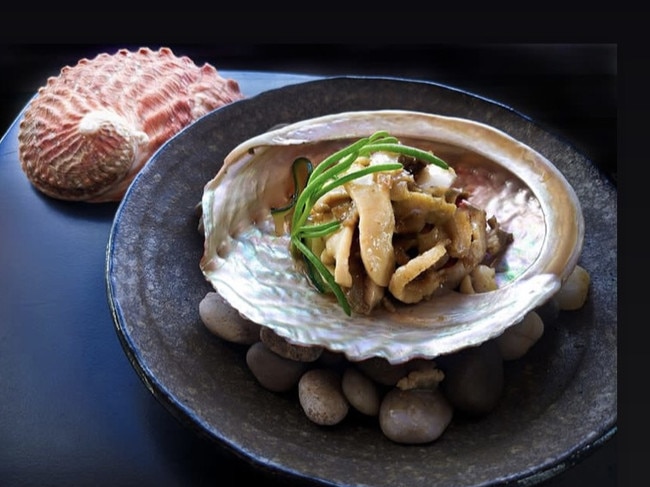
Like powdered rhinoceros horn, from Tokyo to Hong Kong and in Chinatowns the world over, abalone is seen as an aphrodisiac for no good reason other than the fact that the shucked shellfish resembles female genitalia.
Until the 1960s, Australians dismissed abalone as “mutton fish”, used for bait and not much else. But when the world’s abalone fisheries collapsed due to overfishing, demand finally hit southern Australia.
Fishermen and divers started selling the shellfish to Chinese restaurants and a lucrative trade was born – both illicit and legal.
There are still old divers out there with licences they bought for a couple of dollars in the 1970s.
Those licences, with quotas attached, now bring millions of dollars from buyers who want to get into a trade that ranks with high-end gems and precious metals as a commodity. All of which makes the poaching side of the abalone business more cutthroat than ever.
Even when Angelo Romeo’s murder signalled the end of a more peaceful era in 1997, the scene had already changed a lot from the days of Chinese restaurants sneaking poached abalone onto their menus for favoured customers.
Organised poaching meant organised crime links with prostitution rackets, money laundering and illicit gambling.
In the 1990s, the National Crime Authority had evidence of black market abalone from Australia being smuggled overseas to be traded for drugs, notably heroin.
Back then, most poaching was done by seasoned “professionals” — experienced and respected divers who hadn’t bought a licence back when their mates did and so had ended up on the wrong side of the law as the licence prices exploded.
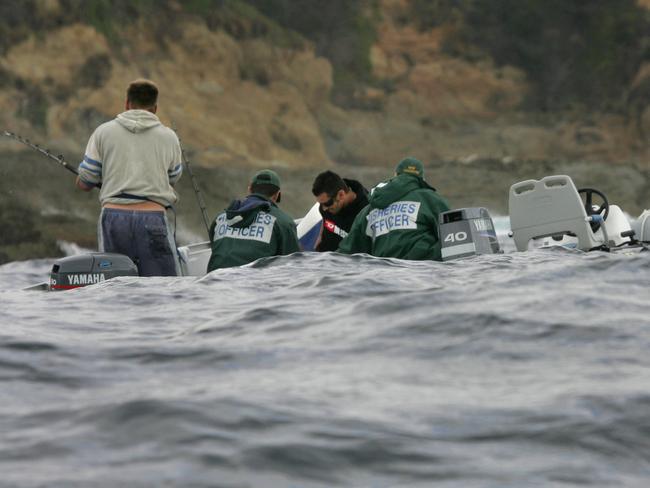
Notable among these was the notorious Cam Strachan, a “brigand” figure either openly or grudgingly admired by fellow poachers, licensed divers and those whose job it was to catch him.
Strahan is now finally content to tinker with the spectacularly fast and seaworthy boats he’s renowned for building at his shed near Hastings. But for close to 40 years he led fisheries officers in two states on chases across Bass Strait.
The serial poacher was arrested more than 100 times, had several boats confiscated (and later used by fisheries officers to chase poachers) and served time in prison, where he was known as “the captain”.
Strahan, son of a Spitfire pilot, has turned over millions of dollars in black market abalone but at a high cost. He once brought home the body of a young diver who died of a brain haemorrhage somewhere in Bass Strait.
Fearing he would be accused of manslaughter if the police pulled him over, Strachan left the body in the boat as he towed it from Port Welshpool to a country hospital.
Another poacher is known to have lost three deckhands in separate incidents. Victorian fisheries officers have occasionally rescued poachers close to shore and know of several who have drowned.
The running battle between poachers and officers has kept poaching within certain limits for decades. But worried abalone industry people in both Victoria and NSW warn that the already endangered resource faces crisis because of the legal system’s failure to stop organised crime using Indigenous “cultural fishing” as a front for systematic plundering of the entire southeast coast.
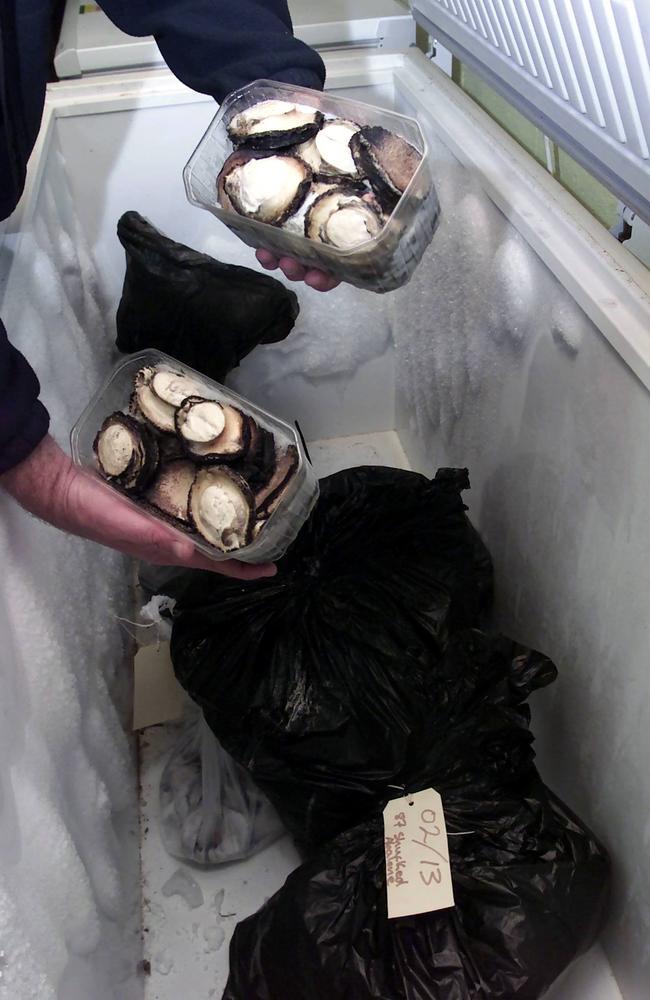
Licensed abalone divers have been warning about the so-called “Mogo syndicate” for several years. This refers to a group of poachers related by blood and marriage who are based around Batemans Bay but have connections up and down the coast. For years, this gang had a bush “factory” to dry and store thousands of stolen abalone for a Chinese crime syndicate that pays in cash and drugs.
Made bold by government apathy, the south coast poachers have pushed abalone theft to a level that has effectively wiped out the fishery along nearly 200km of coast, and now threatens to wipe it out even beyond the Victorian border near Mallacoota.
For the gang, being able to play the Indigenous card makes abalone theft the perfect crime. They can pocket millions of dollars inside a small group but not go to jail for it, facing only fines payable in easy instalments, if at all.
The gang has been stripping the fishery of some 50 tonnes of undersized abalone a year for the same black market that has destroyed abalone stocks across the world.
Proof of this crime are the piles of shucked shells left on shore.
Even before the Victorian government washed its hands of responsibility by sacking half its officers, the Mogo gang was pushing into Victoria. In the first two weeks of the year, they struck at Wingan Inlet, well past Mallacoota. That time, the Victorian fisheries were able to grab them — although it was too late for the undersized abalone they seized. Once shucked, the shellfish dies.
The shucked shells tell a grim story. Most of them are smaller than the legal limit of 117mm, which is the average size of a seven-year-old abalone capable of reproduction.
Taking shellfish too young to breed is a sure way to wipe out the species. Licensed divers take only the biggest — about one in 10, which is sustainable indefinitely.
But here’s the thing. With officer numbers halved, genuine anglers must fear there are not enough boots on the ground or boats on the water to stop black marketeers from a crime against both nature and the law.
The same government that angled for kudos by handing out fishing rods to school kids is now cutting the protection that restored Port Phillip Bay.
And that, as one source said, rolls out the welcome mat for organised crime.
“You’ll blow out the fisheries stocks and you end up having poaching activity like the smokes trade – run by criminals.”


